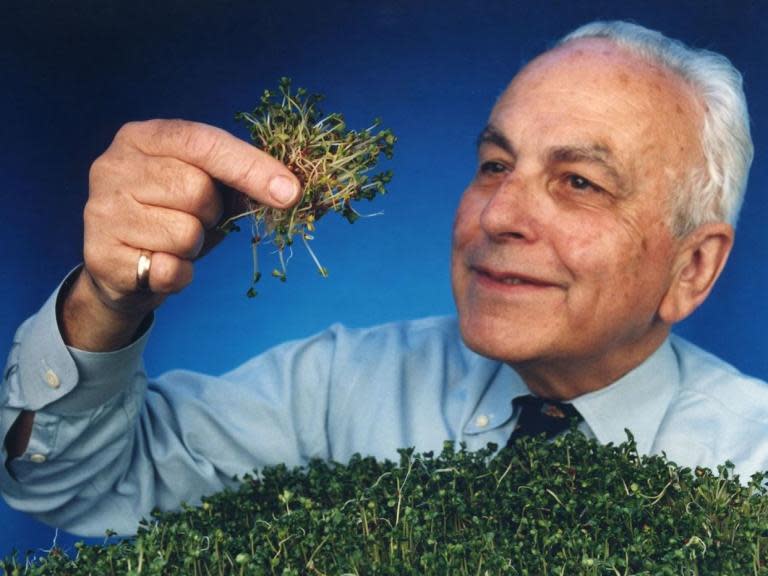Paul Talalay: Scientist who found in broccoli sprouts an aid to preventing cancer
In 1992 pharmacologist Paul Talalay claimed international attention after publishing research that proved a breakthrough in understanding how consuming cruciferous vegetables can reduce the risk of cancer.
This discovery prompted a move towards finding ways to intervene before cancer takes hold – otherwise known as hypothesis of chemoprotection, where phytochemicals, or plant compounds, are said to help guard against cellular damage that contributes to cancer and other chronic diseases.
But Talalay was keen to avoid hype. “Do I tell everybody to eat broccoli sprouts? No, and we can’t say that eating sprouts will guarantee you won’t get cancer or heart disease. But I believe they are protective.”
For much of his career, Talalay, who was 95, taught at Johns Hopkins University School of Medicine. He was, at the outset, an enzymologist who focused on the proteins that interact with testosterone.
He encountered his first cancer patient in medical school and, by the 1980s, had begun to cultivate a “daring thought that cancers of all sorts might actually be preventable”, according to his colleague, Jed Fahey.
Talalay oversaw research that in the 1990s revealed intriguing qualities of sulforaphane, a compound found in broccoli and in even greater quantities in broccoli sprouts. When ingested, sulforaphane binds to a protein inside cells. That event sparks the increased production of enzymes that help cells resist toxic substances, including carcinogens.
Consuming broccoli and other vegetables including kale and watercress helps the body create what Cole described as a “molecular defence” against “environmental insults” that might lead to cancer. He said Talalay’s research had a “broad impact both in biomedical research and in influencing what people eat to stay healthy”.
When Talalay began his work, he lamented the difficulty of convening even a few scientists interested in discussing dietary means of preventing cancer. “Now you can fill large convention halls with people who want to talk about prevention,” Fahey said. “There are thousands of people who are really riding the crest of the waves that he and very few others created.”
Theresa Shapiro, a clinical pharmacologist at Johns Hopkins, said that Talalay’s work “has been around long enough that it has penetrated into the clinic”. Subsequent studies have shown potential benefits of sulforaphane for conditions far beyond cancer, including diabetes and autism.
Paul Talalay was born to Russian Jewish parents in Berlin in 1923. His father, Joseph, was a chemist, and his mother, Sophie, was a homemaker. The family fled Germany after Hitler came to power in 1933 and went first to England, where Talalay continued his schooling, and then to the US in 1940.
Talalay received a bachelor’s degree in molecular biophysics from the Massachusetts Institute of Technology in 1944 before graduating from Yale School of Medicine in 1948. He joined the University of Chicago faculty and, in 1958, he received a grant of more than $500,000 from the American Cancer Society to support his research until he met retirement age. It was at the time the society’s largest grant ever bestowed on a single individual. He came to Johns Hopkins in 1963 and remained on its faculty until his death.
Survivors include his wife of 66 years, the former Pamela Samuels, of Baltimore; four children and four grandchildren. In 1997, Talalay and Fahey founded Brassica Protection Products to market broccoli sprouts and other edibles with health benefits supported by their research. Talalay, whose honours included membership in the National Academy of Sciences, wore on his lapel a silver pin representing a broccoli sprout.
He once said: “I’ve gone to a better diet, a more vegetable-rich diet, since starting this research. We eat broccoli sprouts two to three times a week. I enjoy them on a croissant with a little cream cheese.”
Paul Talalay, American scientist, born 31 March 1923, died 10 March 2019
© Washington Post


